
Fundamental Principles of a Farmers Seed Act
The National Farmers Union calls for a new Seed Act for Farmers in which Canada recognizes the inherent rights of farmers — derived from thousands of years of custom and tradition—to save, reuse, select, exchange, and sell seeds.
Current and proposed restrictions on farmers’ traditional practices, whether from commercial contracts, identity preservation (IP) systems, or legislation—criminalize these ancient practices and harm farmers, citizens, and society in general.
Canadians therefore call upon Parliament to refrain from making any changes to the Seeds Act or to the Plant Breeders’ Rights Act that would further restrict farmers’ rights or add to farmers’ costs.
Further, we call upon Parliament to enshrine in legislation the inalienable rights of farmers and other Canadians to save, reuse, select, exchange, and sell seeds.
In 2002 Canada ratified the United Nations International Treaty on Plant Genetic Resources for Food and Agriculture. As a signatory to this treaty, Canada:
- recognizes the enormous contribution that the local and indigenous communities and farmers of all regions of the world, particularly those in the centres of origin and crop diversity, have made and will continue to make for the conservation and development of plant genetic resources which constitute the basis of food and agriculture production throughout the world.
- agrees not to limit any rights that farmers have to save, use, exchange and sell farm-saved seed/propagating material, subject to national law and as appropriate.
In accordance with this Treaty, and in with the support of Canadians who desire a strong, healthy democratically controlled food system, we propose that Canada develop and implement a Seed Act for Farmers that would allow farmers to retain customary use of seed[1]. The fundamental principles of such a law include:
- The right of farmers to exchange and sell seed, including through farmer-owned organizations such as cooperatives, non-profit organizations and associations.
- The unrestricted right of farmers to grow, save and use seed for planting which cannot be negated by any contract. This right would be supported by
- unrestricted right to clean seed
- unrestricted right to store seed
- unrestricted right to prepare seed for planting, including applying seed treatments
- unrestricted establishment of new seed cleaning plants
- unrestricted access to seed cleaning equipment and parts.
- Seed cleaning operations are an integral part of the seed system and thus
- shall not be prosecuted for the cleaning of protected varieties
- a third party cannot be compelled to give out their client lists.
- Plant breeders rights legislation that would confer the right to claim royalties only at the time of seed sale. (i.e. no endpoint royalties or cascading rights)
- Following expiration of plant breeders rights varieties would be in the public domain allowing for unrestricted use and/or made available under a general public license[2].
- The opportunity for farmers and other non-accredited plant breeders to register new varieties.
- A variety registration system that would protect farmers and our food system by ensuring seed that meets farmers’ needs for quality, reliability and agronomic performance under local conditions across Canada is available. This system would make distinctions in requirements for varieties to be used in conventional or organic production when necessary. Such a system would:
- ensure that varieties remain in the public domain following the expiration of plant breeders’ rights;
- allow varieties to be registered under a general public license to ensure that such varieties remain freely available to farmers and public plant breeders;
- prohibit cancellation of varieties by the variety registrant;
- allow the cancelling of registration for varieties only if evidence, including input from Recommending Committees, supported the cancellation
- have an accessible public appeal mechanism regarding registration and deregistration of varieties to support the public interest. For example, to prevent the registration of unwanted genetically modified varieties; to maintain registration of older varieties;
- require robust, independent third-party merit testing for new varieties to ensure they are as good as or better than existing varieties, which takes into account market harm, ecological impacts, multiple farming systems, nutrition, disease resistance and other relevant factors;
- formally recognize the value of land races that are not intended to have uniformity and stability as defining characteristics, establishing mechanisms to allow heritage plant varieties such as Red Fife Wheat to be utilized in appropriate rotations and markets
- A dispute settlement process that uses due process that would ensure
- inspection and sampling would be done only with the farmer’s explicit permission and in the presence of, and verified by, a qualified neutral third party.
- binding arbitration carried out by a public commission would settle questions of infringement, etc. between farmers and companies. Such a commission would be modelled on the process used by the Canadian Grain Commission in settling grain grading disputes.
- No possibility that the production of seed could ever be considered counterfeiting or a violation of trademark.
- Prohibition of Genetic Use Restriction Technologies (GURTs), sometimes referred to as Terminator Technology.
- No gene patents or other patent mechanisms on seed.
[1]“Seed” means seed and/or propagating material throughout this document
[2] A general public license is a binding legal agreement that makes germplasm available to plant breeders on the condition that it must likewise be made available to other breeders under a general public license, and without further restriction.
Stay informed. National and local farm news, research, policy and advocacy efforts, straight to your inbox.
Subscribe to email updates from the National Farmers Union.
Do you work in media? Contact communications@nfu.ca for media-specific communications.